 W
W"Baby, Please Don't Go" is a traditional blues song that was popularized by Delta blues musician Big Joe Williams in 1935. Many cover versions followed, leading to its description as "one of the most played, arranged, and rearranged pieces in blues history" by French music historian Gérard Herzhaft.
 W
W"Bottle Up and Go" or "Bottle It Up and Go" is a song that is a standard of the blues. Based on earlier songs, Delta bluesman Tommy McClennan recorded "Bottle It Up and Go" in 1939. The song has been interpreted and recorded by numerous artists, sometimes using alternate titles, such as "Step It Up and Go", "Shake It Up and Go", etc.
 W
W"By The Light of the Silvery Moon" or "By the Light of the Silv'ry Moon" is a popular love song. The music was written by Gus Edwards, and the lyrics by Edward Madden. The song was published in 1909 and first performed on stage by Lillian Lorraine in the Ziegfeld Follies of 1909. It was one of a series of moon-related Tin Pan Alley songs of the era. The song was also used in the short-lived Broadway show Miss Innocence when it was sung by Frances Farr.
 W
W"Darktown Strutters' Ball" is a popular song by Shelton Brooks, published in 1917. The song has been recorded many times and is considered a popular and jazz standard. There are many variations of the title, including "At the Darktown Strutters' Ball", "The Darktown Strutters' Ball", and just "Strutters' Ball".
 W
W"Elmer's Tune" is a 1941 big band and jazz standard written by Elmer Albrecht, Dick Jurgens and Sammy Gallop. Glenn Miller and his Orchestra and Dick Jurgens and his Orchestra both charted with recordings of the composition.
 W
WDer Fuehrer's Face is a 1943 American animated anti-Nazi propaganda short film produced by Walt Disney Productions, created in 1942 and released on January 1, 1943 by RKO Radio Pictures. The cartoon, which features Donald Duck in a nightmare setting working at a factory in Nazi Germany, was made in an effort to sell war bonds and is an example of American propaganda during World War II. The film was directed by Jack Kinney and written by Joe Grant and Dick Huemer. Spike Jones released a version of Oliver Wallace's theme for the short before the film was released.
 W
W"Goin' Down Slow" or "Going Down Slow" is a blues song composed by American blues singer St. Louis Jimmy Oden. It is considered a blues standard and "one of the most famous blues of all".
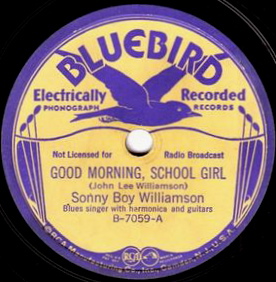 W
W"Good Morning, School Girl" is a blues standard which has been identified as an influential part of the blues canon. Pre-war Chicago blues vocalist and harmonica pioneer John Lee "Sonny Boy" Williamson first recorded it in 1937. Subsequently, a variety of artists have recorded versions of the song, usually calling it "Good Morning Little Schoolgirl".
 W
W"I'm Always Chasing Rainbows" is a popular Vaudeville song. The music is credited to Harry Carroll, but the melody is adapted from Fantaisie-Impromptu by Frédéric Chopin. The lyrics were written by Joseph McCarthy, and the song was published in 1917. It was introduced in the Broadway show Oh, Look! which opened in March 1918. The song was sung in the show by the Dolly Sisters. Judy Garland sang it in the 1941 film Ziegfeld Girl. It was subsequently sung by Jack Oakie in the 1944 film The Merry Monahans and was again featured in the 1945 film The Dolly Sisters, where it was sung by John Payne. It was also included for part of the run of the 1973 revival of Irene.
 W
W"In the Mood" is a popular big band-era jazz standard recorded by American bandleader Glenn Miller. "In the Mood" is based on the composition "Tar Paper Stomp" by Wingy Manone. The first recording under the name "In the Mood" was released by Edgar Hayes & His Orchestra in 1938.
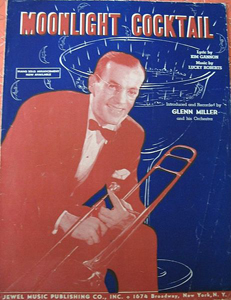 W
W"Moonlight Cocktail" is a 1942 big band song recorded by Glenn Miller during World War II. The music was composed by Luckey Roberts with lyrics by Kim Gannon.
 W
W"Moonlight Serenade" is an American swing ballad composed by Glenn Miller with subsequent lyrics by Mitchell Parish. It was an immediate phenomenon when released in May 1939 as an instrumental arrangement, though it had been adopted and performed as Miller's signature tune as early as 1938, even before it had been given the name "Moonlight Serenade." In 1991, Miller's recording of "Moonlight Serenade" was inducted into the Grammy Hall of Fame.
 W
W"The Nearness of You" is a popular song written in 1938 by Hoagy Carmichael with lyrics by Ned Washington. The song debuted in the 1938 movie Romance in the Dark.
 W
W"Poor Butterfly" is a popular song. It was inspired by Giacomo Puccini's opera Madame Butterfly and contains a brief musical quote from the Act two duet Tutti i fior in the verse.
 W
W"Rock Me Baby" is a blues standard that has become one of the most recorded blues songs of all time. It originated as "Rockin' and Rollin'", a 1951 song by Lil' Son Jackson, itself inspired by earlier blues. Renditions by Muddy Waters and B.B. King made the song well-known. When B.B. King's recording of "Rock Me Baby" was released in 1964, it became his first single to reach the Top 40 in Billboard magazine's Hot 100 chart.
 W
W"Santa Claus Is Comin' to Town" is a Christmas song written by J. Fred Coots and Haven Gillespie. The earliest known recorded version of the song was by banjoist Harry Reser and his band on October 24, 1934. It was then sung on Eddie Cantor's radio show in November 1934. This version became an instant hit with orders for 500,000 copies of sheet music and more than 30,000 records sold within 24 hours. The version for Bluebird Records by George Hall and His Orchestra was very popular in 1934 and reached the various charts of the day. The song has been recorded by over 200 artists, including Bing Crosby and The Andrews Sisters, The Crystals, Mariah Carey, Neil Diamond, Bruce Springsteen, Frank Sinatra, Bill Evans, Chris Isaak, The Temptations, Michael Bublé, and The Jackson 5.
 W
W"Shake 'Em On Down" is a Delta blues song by American musician Bukka White. He recorded it in Chicago in 1937 around the beginning of his incarceration at the infamous Parchman Prison Farm in Mississippi.
 W
W"Sitting on Top of the World" is a country blues song written by Walter Vinson and Lonnie Chatmon. They were core members of the Mississippi Sheiks, who first recorded it in 1930. Vinson claimed to have composed the song one morning after playing at a white dance in Greenwood, Mississippi. It became a popular crossover hit, and was inducted into the Grammy Hall of Fame in 2008.
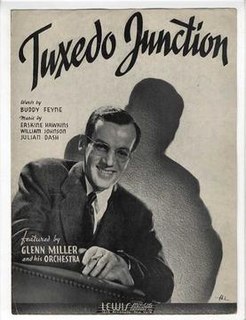 W
W"Tuxedo Junction" is a popular song written by Erskine Hawkins, Bill Johnson, Julian Dash with lyrics by Buddy Feyne. The song was introduced by Erskine Hawkins & His Orchestra, a college dance band previously known as the Bama State Collegians. RCA released it in 1939 and it climbed to #7 on the American pop charts. The song was a No. 1 hit for Glenn Miller & His Orchestra in 1940.
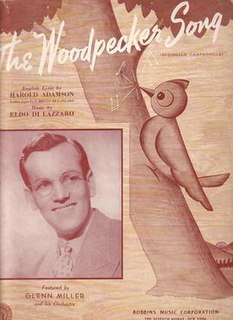 W
W"The Woodpecker Song" is originally an Italian song. The music was written by Eldo Di Lazzaro in 1939, while the Italian lyrics were written by Bruno Cherubini. The English lyrics were written by Harold Adamson. The song became a hit in 1940, recorded by Glenn Miller and His Orchestra, The Andrews Sisters, and Kate Smith in 1940.
 W
W"Worried Life Blues" is a blues standard and one of the most recorded blues songs of all time. Originally recorded by Big Maceo Merriweather in 1941, "Worried Life Blues" was an early blues hit and Maceo's most recognized song. An earlier song inspired it and several artists have had record chart successes with their interpretations of the song.
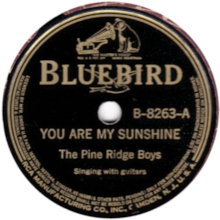 W
W"You Are My Sunshine" is a song copyrighted and published by Jimmie Davis and Charles Mitchell in 1940. According to BMI, it has been recorded by more than 350 artists, and translated into 30 languages. In 1977, the Louisiana State Legislature decreed that “You Are My Sunshine” would be a state song, to honor two-time governor Jimmie Davis.